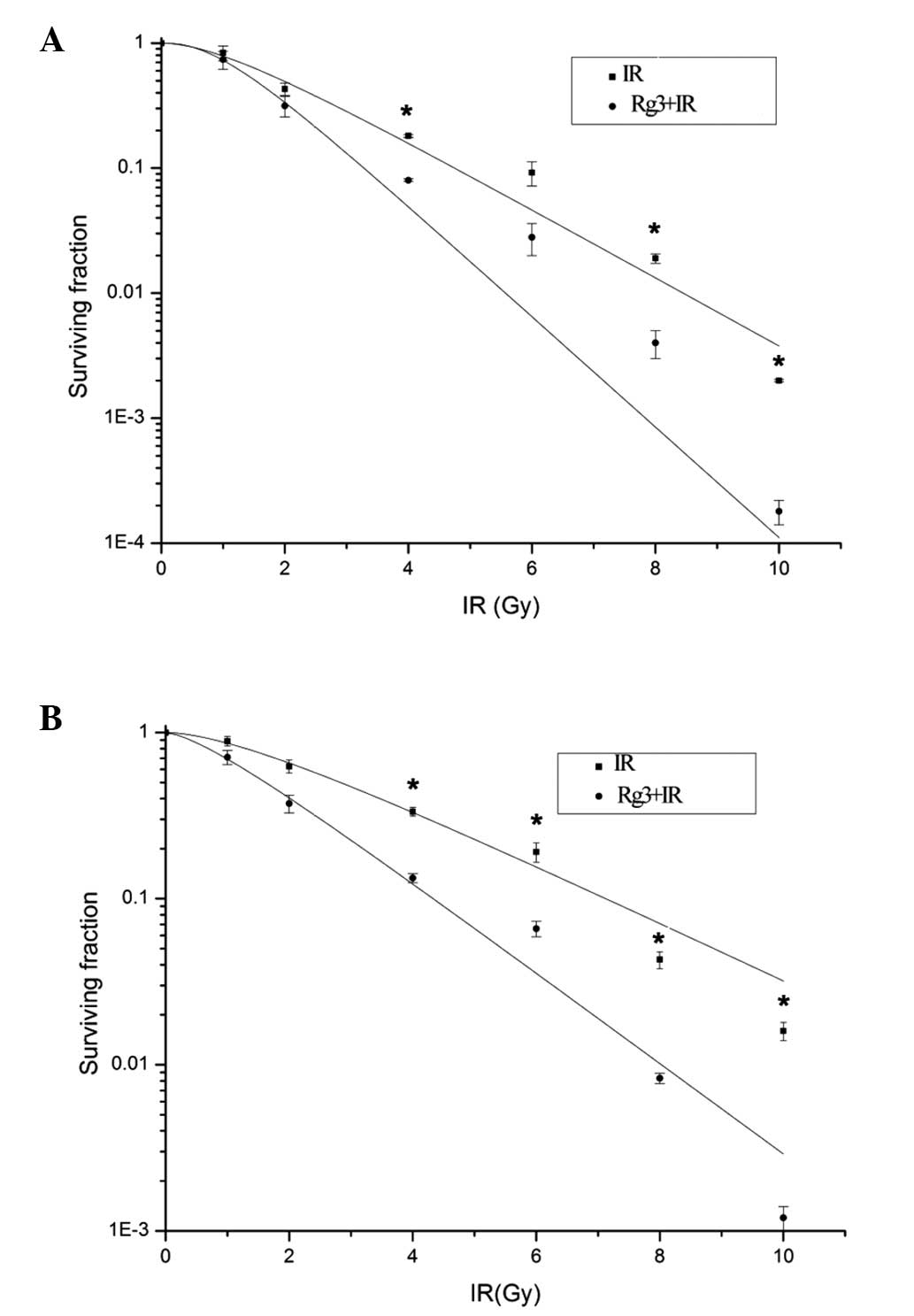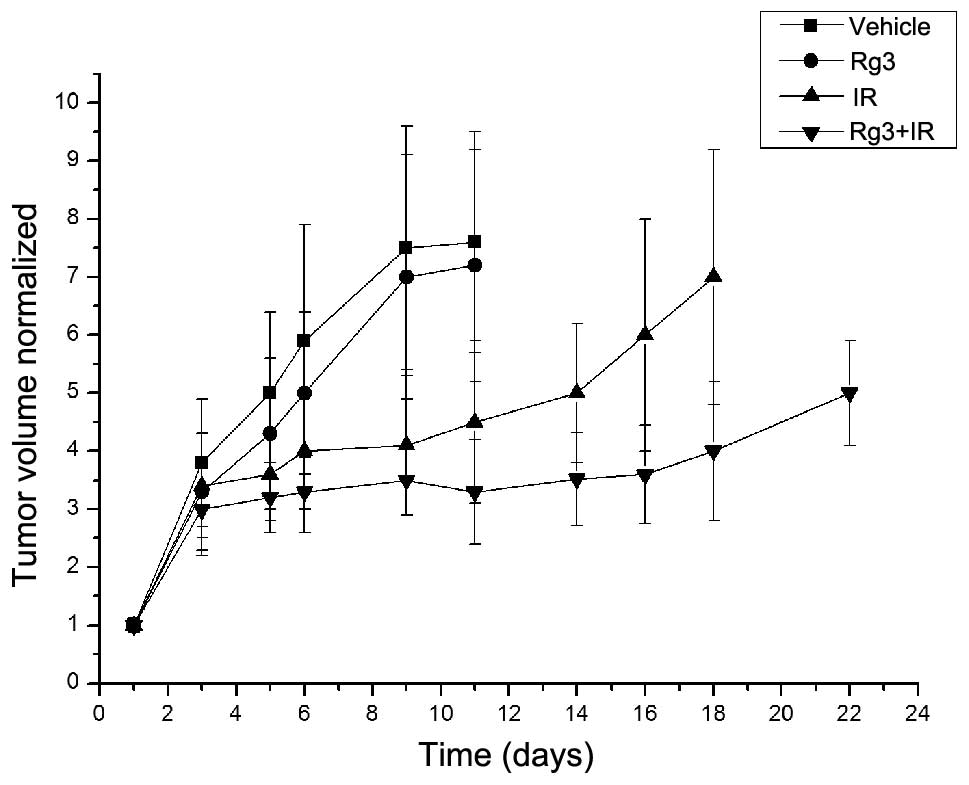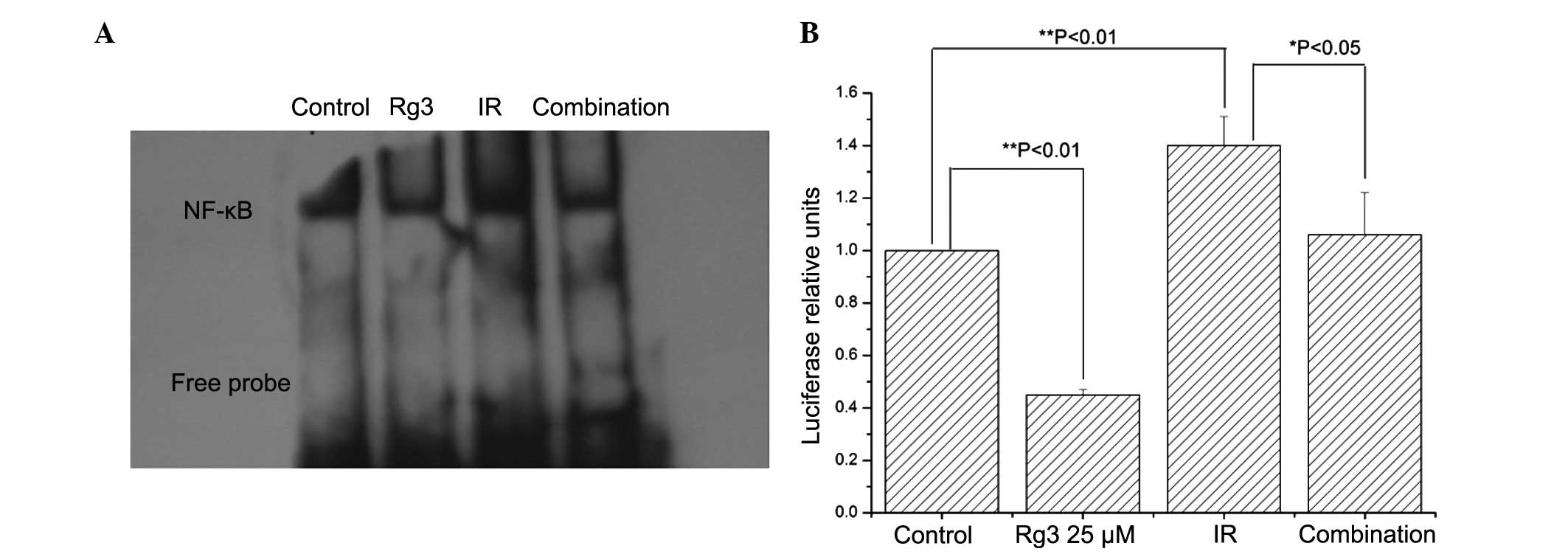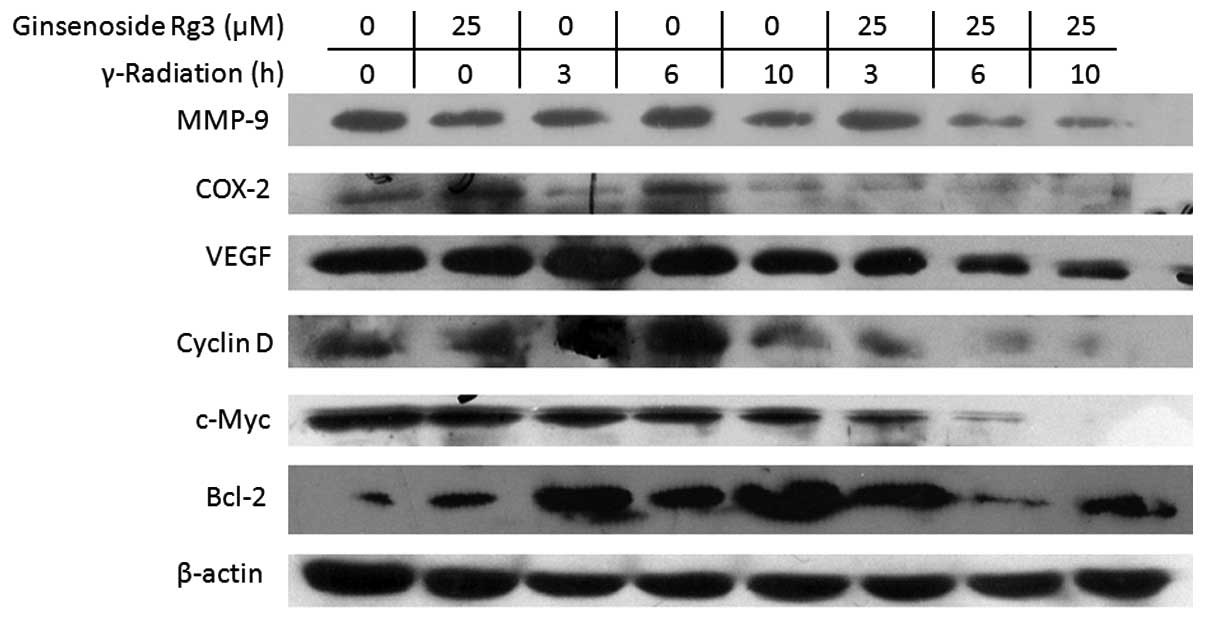|
1
|
Siegel R, Naishadham D and Jemal A: Cancer
statistics, 2012. CA Cancer J Clin. 62:10–29. 2012. View Article : Google Scholar : PubMed/NCBI
|
|
2
|
Lal R, Enting D and Kristeleit H: Systemic
treatment of non-small-cell lung cancer. Eur J Cancer.
47:S375–S377. 2011. View Article : Google Scholar : PubMed/NCBI
|
|
3
|
Cole AJ, Hanna GG, Jain S and O’Sullivan
JM: Motion management for radical radiotherapy in non-small cell
lung cancer. Clin Oncol (R Coll Radiol). 26:67–80. 2014. View Article : Google Scholar
|
|
4
|
Wardman P: Chemical radiosensitizers for
use in radiotherapy. Clin Oncol (R Coll Radiol). 19:397–417. 2007.
View Article : Google Scholar
|
|
5
|
Jia L, Zhao Y and Liang XJ: Current
evaluation of the millennium phytomedicine- ginseng (II): Collected
chemical entities, modern pharmacology and clinical applications
emanated from traditional Chinese medicine. Curr Med Chem.
16:2924–2942. 2009. View Article : Google Scholar :
|
|
6
|
Keum YS, Han SS, Chun KS, et al:
Inhibitory effects of the ginsenoside Rg3 on phorbol ester-induced
cyclooxygenase-2 expression, NF-kappaB activation and tumor
promotion. Mutat Res. 523–524:75–85. 2003. View Article : Google Scholar
|
|
7
|
Munshi A, Kurland JF, Nishikawa T, et al:
Inhibition of constitutively activated nuclear factor-kappaB
radiosensitizes human melanoma cells. Mol Cancer Ther. 3:985–992.
2004.PubMed/NCBI
|
|
8
|
Kim WY, Kim JM, Han SB, et al: Steaming of
ginseng at high temperature enhances biological activity. J Nat
Prod. 63:1702–1704. 2000. View Article : Google Scholar
|
|
9
|
Wang Z, Cook T, Alber S, et al: Adenoviral
gene transfer of the human inducible nitric oxide synthase gene
enhances the radiation response of human colorectal cancer
associated with alterations in tumor vascularity. Cancer Res.
64:1386–1395. 2004. View Article : Google Scholar : PubMed/NCBI
|
|
10
|
Miyake H, Tolcher A and Gleave ME:
Antisense Bcl-2 oligodeoxynucleotides inhibit progression to
androgen-independence after castration in the Shionogi tumor model.
Cancer Res. 59:4030–4034. 1999.PubMed/NCBI
|
|
11
|
Takada Y, Khuri FR and Aggarwal BB:
Protein farnesyltransferase inhibitor (SCH 66336) abolishes
NF-kappaB activation induced by various carcinogens and
inflammatory stimuli leading to suppression of NF-kappaB-regulated
gene expression and up-regulation of apoptosis. J Biol Chem.
279:26287–26299. 2004. View Article : Google Scholar : PubMed/NCBI
|
|
12
|
Kunnumakkara AB, Diagaradjane P, Guha S,
et al: Curcumin sensitizes human colorectal cancer xenografts in
nude mice to gamma-radiation by targeting nuclear
factor-kappaB-regulated gene products. Clin Cancer Res.
14:2128–2136. 2008. View Article : Google Scholar : PubMed/NCBI
|
|
13
|
Shen HM and Tergaonkar V: NFkappaB
signaling in carcinogenesis and as a potential molecular target for
cancer therapy. Apoptosis. 14:348–363. 2009. View Article : Google Scholar : PubMed/NCBI
|
|
14
|
Yu SD, Liu FY and Wang QR: Notch
inhibitor: a promising carcinoma radiosensitizer. Asian Pac J
Cancer Prev. 13:5345–5351. 2012. View Article : Google Scholar
|
|
15
|
Aravindan N, Madhusoodhanan R, Ahmad S,
Johnson D and Herman TS: Curcumin inhibits NFkappaB mediated
radio-protection and modulate apoptosis related genes in human
neuroblastoma cells. Cancer Biol Ther. 7:569–576. 2008. View Article : Google Scholar : PubMed/NCBI
|
|
16
|
Johnson GE, Ivanov VN and Hei TK:
Radiosensitization of melanoma cells through combined inhibition of
protein regulators of cell survival. Apoptosis. 13:790–802. 2008.
View Article : Google Scholar : PubMed/NCBI
|
|
17
|
Raffoul JJ, Wang Y, Kucuk O, Forman JD,
Sarkar FH and Hillman GG: Genistein inhibits radiation-induced
activation of NF-kappaB in prostate cancer cells promoting
apoptosis and G2/M cell cycle arrest. BMC Cancer. 6:1072006.
View Article : Google Scholar : PubMed/NCBI
|
|
18
|
Sun Y, St Clair DK, Fang F, et al: The
radiosensitization effect of parthenolide in prostate cancer cells
is mediated by nuclear factor-kappaB inhibition and enhanced by the
presence of PTEN. Mol Cancer Ther. 6:2477–2486. 2007. View Article : Google Scholar : PubMed/NCBI
|
|
19
|
Kamer S, Ren Q and Dicker AP: Differential
radiation sensitization of human cervical cancer cell lines by the
proteasome inhibitor velcade (bortezomib, PS-341). Arch Gynecol
Obstet. 279:41–46. 2009. View Article : Google Scholar
|
|
20
|
Eberhardt W, Pöttgen C and Stuschke M:
Chemoradiation paradigm for the treatment of lung cancer. Nat Clin
Pract Oncol. 3:188–199. 2006. View Article : Google Scholar : PubMed/NCBI
|
|
21
|
Block WD, Merkle D, Meek K and Lees-Miller
SP: Selective inhibition of the DNA-dependent protein kinase
(DNA-PK) by the radiosensitizing agent caffeine. Nucleic Acids Res.
32:1967–1972. 2004. View Article : Google Scholar : PubMed/NCBI
|
|
22
|
Chendil D, Ranga RS, Meigooni D,
Sathishkumar S and Ahmed MM: Curcumin confers radiosensitizing
effect in prostate cancer cell line PC-3. Oncogene. 23:1599–1607.
2004. View Article : Google Scholar : PubMed/NCBI
|
|
23
|
Raffoul JJ, Banerjee S, Singh-Gupta V, et
al: Down-regulation of apurinic/apyrimidinic endonuclease 1/redox
factor-1 expression by soy isoflavones enhances prostate cancer
radiotherapy in vitro and in vivo. Cancer Res. 67:2141–2149. 2007.
View Article : Google Scholar : PubMed/NCBI
|
|
24
|
Shibata S: Chemistry and cancer preventing
activities of ginseng saponins and some related triterpenoid
compounds. J Korean Med Sci. 16:S28–S37. 2001. View Article : Google Scholar : PubMed/NCBI
|
|
25
|
Van Waes C: Nuclear factor-κB in
development, prevention, and threapy of cancer. Clin Cancer Res.
13:1076–1082. 2007. View Article : Google Scholar : PubMed/NCBI
|
|
26
|
Li N and Karin M: Ionizing radiation and
short wavelength UV activate NF-kappaB through two distinct
mechanisms. Proc Natl Acad Sci USA. 95:13012–13017. 1998.
View Article : Google Scholar : PubMed/NCBI
|
|
27
|
Kim JW, Jung SY, Kwon YH, et al:
Ginsenoside Rg3 attenuates tumor angiogenesis via inhibiting
bioactivities of endothelial progenitor cells. Cancer Biol Ther.
13:504–515. 2012. View Article : Google Scholar : PubMed/NCBI
|



















